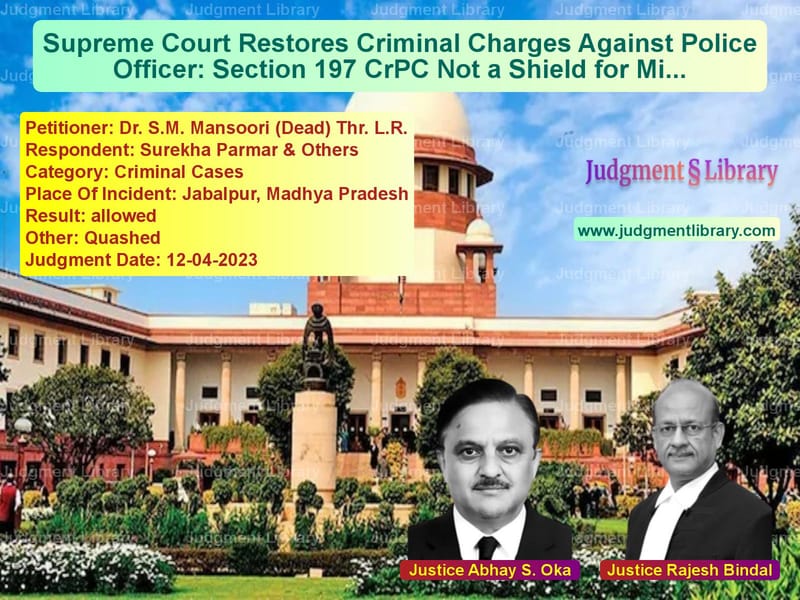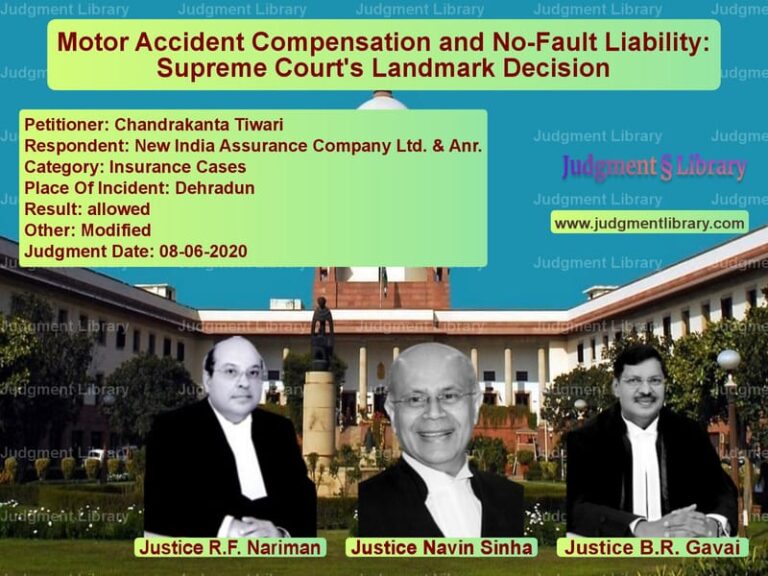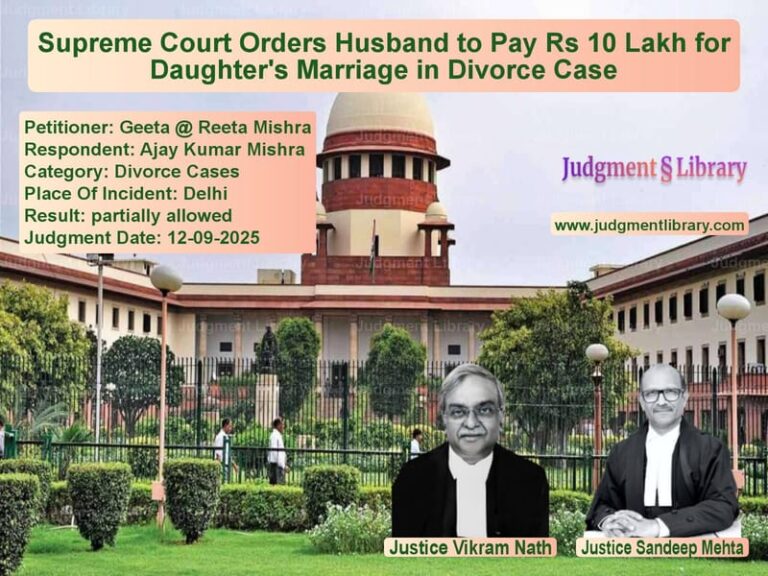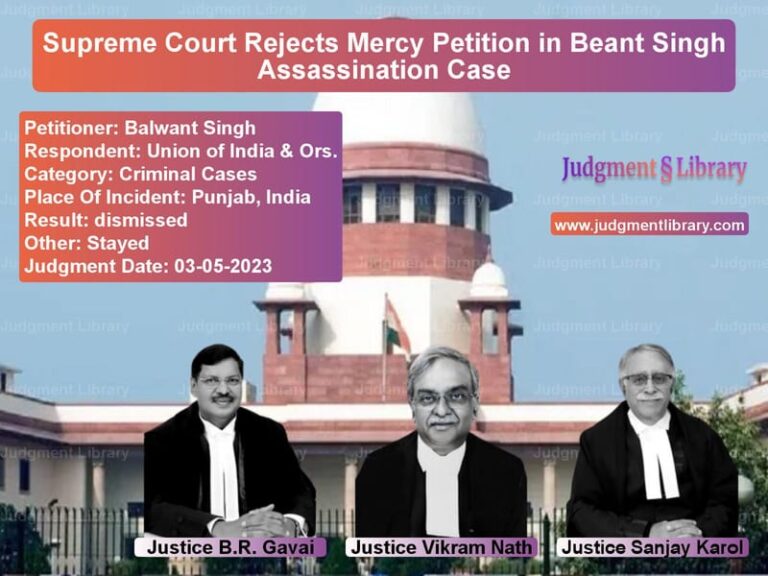Supreme Court Restores Criminal Charges Against Police Officer: Section 197 CrPC Not a Shield for Misuse of Power
The Supreme Court of India, in Dr. S.M. Mansoori (Dead) Thr. L.R. v. Surekha Parmar & Others, reinstated criminal proceedings against a police officer accused of misconduct and abuse of power. The ruling overturned the Madhya Pradesh High Court’s decision to quash the charges under Section 147, 323, 342, 504, and 506-B of the Indian Penal Code (IPC), which had been dismissed on the ground that prior sanction under Section 197 CrPC was necessary.
Background of the Case
The case stemmed from an incident on July 6-7, 2000, when Surekha Parmar, an Assistant Sub-Inspector at Mahila Police Station, Jabalpur, along with other police personnel, allegedly assaulted and humiliated Dr. S.M. Mansoori and his family during an illegal arrest. The appellant claimed that:
- On July 6, 2000, a team of police officers led by Surekha Parmar forcibly entered his house in Anuppur to arrest him and his family members.
- At 5:30 AM on July 7, 2000, the officers allegedly assaulted Dr. Mansoori and his son Dr. Mushtaq Mansoori, dragged them out of their rooms, and verbally abused them.
- Dr. Mushtaq was allegedly beaten and robbed of a gold chain, while cash of Rs. 15,000 and four gold ornaments were taken from the house.
- The officers handcuffed the family members, paraded them to Anuppur Police Station, and later detained them at Mahila Police Station, Jabalpur.
- The officers allegedly demanded a bribe of Rs. 30,000 for their release.
Dr. Mansoori filed a private complaint under Section 200 CrPC, following which the Judicial Magistrate First Class (JMFC) took cognizance of the offenses.
Petitioner’s Arguments
The appellant’s counsel argued:
- The police officer’s actions were not part of her official duty and were therefore not protected under Section 197 CrPC.
- The raid was unauthorized because the officers had no jurisdiction in Anuppur.
- Surekha Parmar and her team engaged in criminal conduct, including assault and extortion.
- The High Court had previously refused to quash the case on May 17, 2010, making the second challenge untenable.
Respondent’s Arguments
The defense argued:
- The officers were acting in their official capacity to arrest a person accused in a dowry case (under Section 498-A IPC).
- The officers had immunity under Section 197 CrPC as the alleged acts were done while executing their duties.
- The complaint was an attempt to harass the police for carrying out their work.
Key Legal Issues Considered
- Was sanction under Section 197 CrPC required before prosecuting the police officer?
- Did the officer act in her official capacity or misuse power?
- Did the High Court err in quashing the case despite previous rejection of similar relief?
Supreme Court’s Observations
The Supreme Court ruled in favor of the appellant, stating:
- “Sanction under Section 197 CrPC is not a shield for acts committed outside the scope of official duties.”
- “Allegations of assault, robbery, and extortion do not fall within the ambit of police duties.”
- “The High Court misapplied Section 197 CrPC and ignored the serious allegations.”
- “The previous order from May 17, 2010, had already refused to quash the case, and the subsequent decision contradicts the earlier ruling.”
The Court referenced the case of Shambhoo Nath Misra v. State of U.P. and Prakash Singh Badal v. State of Punjab, which clarified that immunity under Section 197 CrPC does not extend to acts done with criminal intent.
Final Judgment
The Supreme Court ruled:
“The appeal is allowed. The High Court’s judgment dated 12th April 2023 is set aside. The charges framed by the Trial Court are restored.”
Impact of the Judgment
- Limits police immunity – Officers cannot misuse their power under the guise of official duty.
- Restores rule of law – Ensures accountability for illegal police actions.
- Reinforces Section 197 CrPC interpretation – Clarifies when prior sanction is required.
Conclusion
The Supreme Court’s ruling in Dr. S.M. Mansoori v. Surekha Parmar is a landmark judgment ensuring that police officers cannot misuse their authority and evade prosecution. By rejecting the broad application of Section 197 CrPC, the Court has reinforced the principle that criminal misconduct must be prosecuted, irrespective of official status.
Petitioner Name: Dr. S.M. Mansoori (Dead) Thr. L.R..Respondent Name: Surekha Parmar & Others.Judgment By: Justice Abhay S. Oka, Justice Rajesh Bindal.Place Of Incident: Jabalpur, Madhya Pradesh.Judgment Date: 12-04-2023.
Don’t miss out on the full details! Download the complete judgment in PDF format below and gain valuable insights instantly!
Download Judgment: dr.-s.m.-mansoori-(d-vs-surekha-parmar-&-oth-supreme-court-of-india-judgment-dated-12-04-2023.pdf
Directly Download Judgment: Directly download this Judgment
See all petitions in Custodial Deaths and Police Misconduct
See all petitions in SC/ST Act Case
See all petitions in Fraud and Forgery
See all petitions in Judgment by Abhay S. Oka
See all petitions in Judgment by Rajesh Bindal
See all petitions in allowed
See all petitions in Quashed
See all petitions in supreme court of India judgments April 2023
See all petitions in 2023 judgments
See all posts in Criminal Cases Category
See all allowed petitions in Criminal Cases Category
See all Dismissed petitions in Criminal Cases Category
See all partially allowed petitions in Criminal Cases Category







